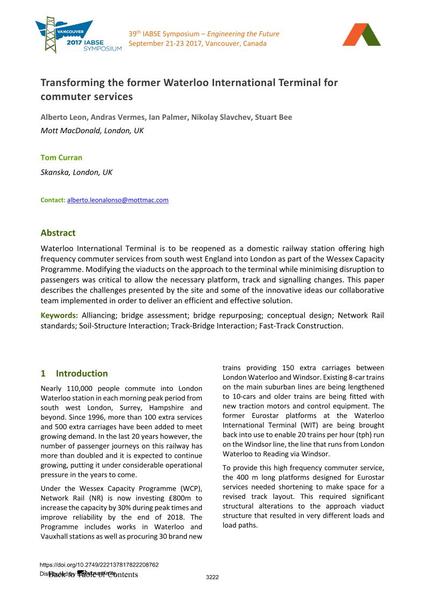Transforming the former Waterloo International Terminal for commuter services

|
|
|||||||||||
Bibliografische Angaben
| Autor(en): |
Alberto Leon
(Mott MacDonald, London, UK)
Andras Vermes (Mott MacDonald, London, UK) Ian Palmer (Mott MacDonald, London, UK) Nikolay Slavchev (Mott MacDonald, London, UK) Stuart Bee (Mott MacDonald, London, UK) Tom Curran (Skanska, London, UK) |
||||
|---|---|---|---|---|---|
| Medium: | Tagungsbeitrag | ||||
| Sprache(n): | Englisch | ||||
| Tagung: | IABSE Symposium: Engineering the Future, Vancouver, Canada, 21-23 September 2017 | ||||
| Veröffentlicht in: | IABSE Symposium Vancouver 2017 | ||||
|
|||||
| Seite(n): | 3222-3230 | ||||
| Anzahl der Seiten (im PDF): | 9 | ||||
| Jahr: | 2017 | ||||
| DOI: | 10.2749/222137817822208762 | ||||
| Abstrakt: |
Waterloo International Terminal is to be reopened as a domestic railway station offering high frequency commuter services from south west England into London as part of the Wessex Capacity Programme. Modifying the viaducts on the approach to the terminal while minimising disruption to passengers was critical to allow the necessary platform, track and signalling changes. This paper describes the challenges presented by the site and some of the innovative ideas our collaborative team implemented in order to deliver an efficient and effective solution. |
||||
| Stichwörter: |
Boden-Bauwerk-Interaktion Gleis-Tragwerks-Interaktion
|
||||
